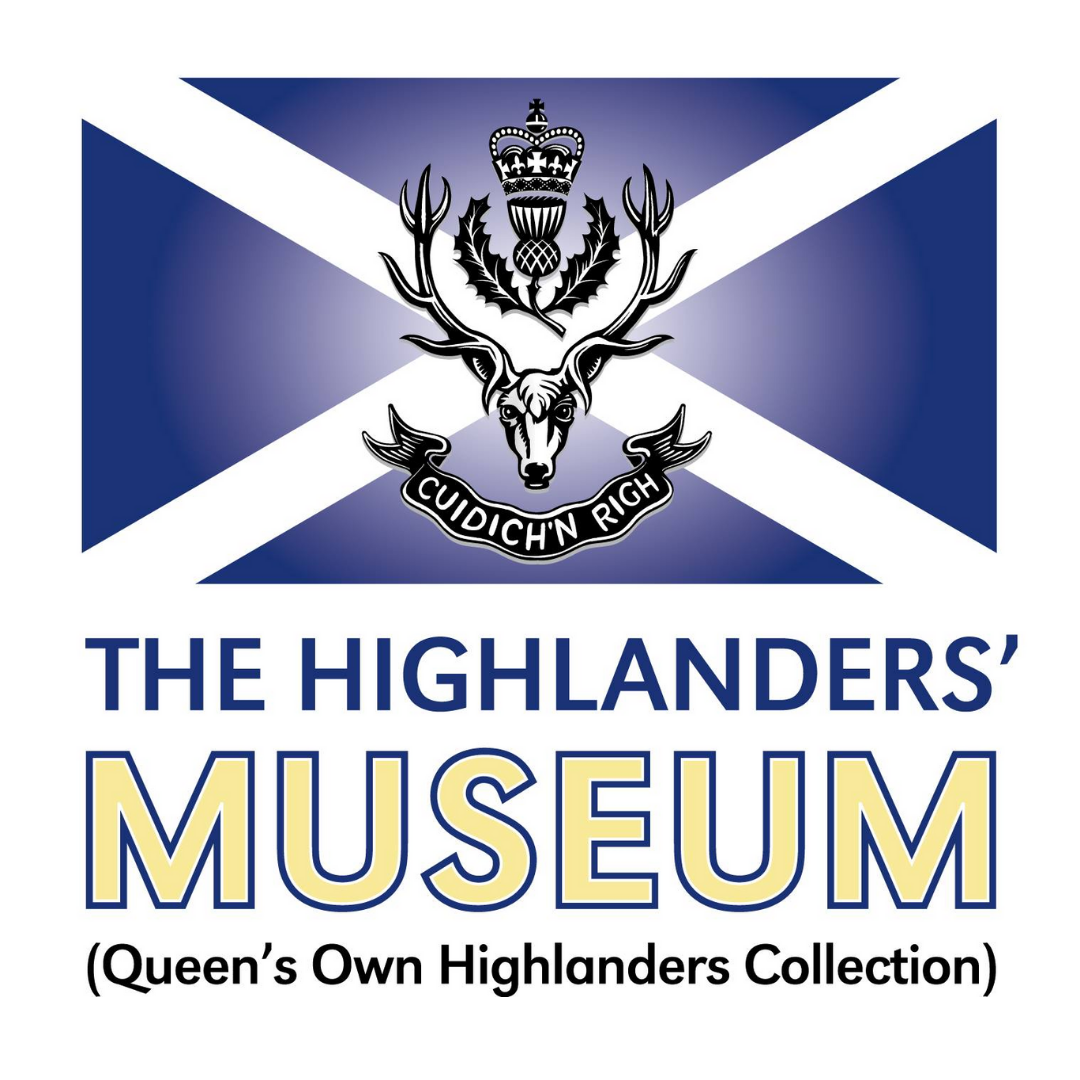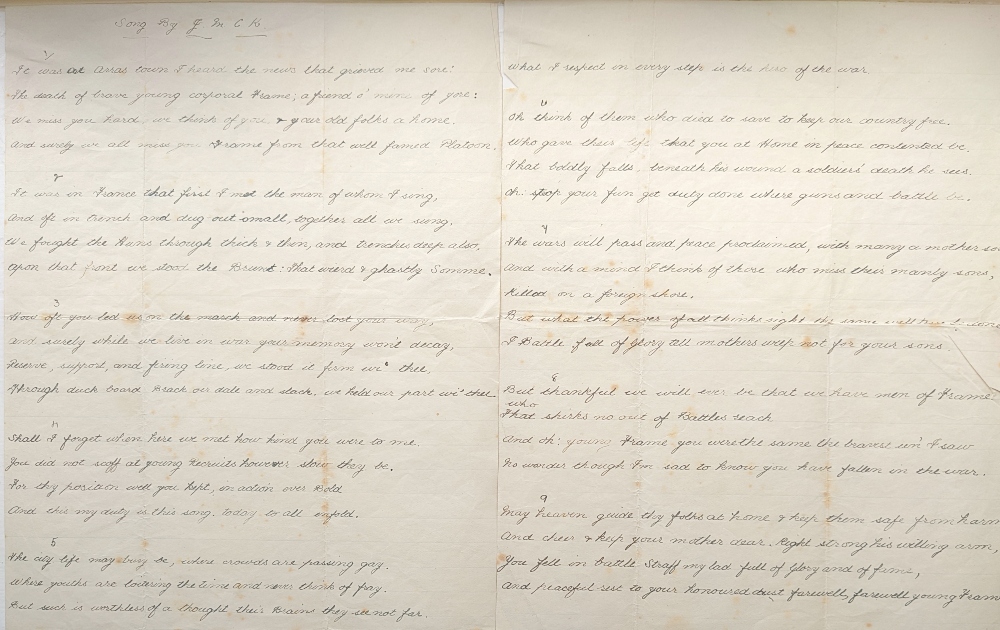A Poem From the Archive
Song by J M C K
Poems from the highlanders’ museum
Welcome to the first edition of our new poetry feature! Here at The Highlanders’ Museum, a recent search through the extensive archive of documents donated by relatives of those who served in the Seaforths over the last 200 years has uncovered many words from less well known and long forgotten war poets. Whilst several date from WWI, the earliest is from Edinburgh in 1809 (the Departure of the Seaforths) and the latest from Malaya in 1950 (The Jungle Soldier). Some are poignant valedictories to fallen comrades (My Pal Roddy), whilst others take a humorous look at life in the army (Charge of the Brass Hat Brigade).
The Seaforth Highlanders have their own war poet in Lieutenant Ewart Alan Mackintosh who served in France with the 1/5th (Sutherland & Caithness) from July 1915 and later with 1/4th (Ross-Highland) until his death at the Battle of Cambrai in November 1917. Two volumes of his poetry were published, ‘A Highland Regiment in 1917’ and ‘War, the Liberator and other Pieces’ in 1918; the last line from his poem ‘No Man’s Land’ is the title of his biography ‘Can’t shoot a man with a cold’ published in 2004.
As the poems in the archive have come to the Museum by way of personal donations, few will have been previously published and certainly not online. Each month we will feature a reproduction of a poem, with biographical details of the author, alongside commentary on the subject or historic background in which it was written.
Song by J M C K
1.
It was at Arras town I heard the news that grieved me sore
The death of brave young corporal Frame; a friend o’mine of yore
We miss you hard, we think of you & your old folks a’home
And surely we all miss you Frame from that well famed Platoon
2.
It was in France that first I met the man of whom I sing
And oft in trench and dug-out small, together all we sung.
We fought the Huns through thick and thin, and trenches deep also,
Upon that front we stood the brunt: that weird & ghastly Somme.
3.
How oft you led us on the march and never lost your way,
And surely while we live in war your memory won’t decay,
Reserve, support and firing line, we stood it firm wi’thee,
Through duck board brack oe’r dale and slack, we held out part wi’thee
4.
Shall I forget when here we met how kind you were to me.
You did not scoff at young recruits however slow they be.
For thy position well you kept, in action over Bold
And this my duty is this song today to all unfold.
5.
The city life may busy be, where crowds are passing gay.
Where youths are loitering the time and never think of fray.
But such is worthless of a thought their brains they see not far.
What I respect in every step is the hero of the war.
6.
Oh think of them who died to save to keep our country free
Who gave their life that you at Home in peace contented be.
That boldly falls beneath his wound a soldier’s death he sees
Oh stop your fun get duty done where guns and battle be.
7.
The wars will pass and peace proclaimed, with many a mother sore,
And with a mind I think of those who miss their manly sons, killed on a foreign shore.
But what the power of all thinks right the same will true be done
I Battle fall of glory tell, mothers weep not for your sons.
8.
But thankful we will ever be that we have men of Frame
Who shirks no out of Battle’s reach
And oh: young Frame you were the same the bravest een’ I saw
No wonder though I’m sad to know you have fallen in the war.
9.
May heaven guide thy folks at home & keep them safe from harm,
And cheer & keep your mother dear. Right strong his willing arm,
You fell in battle strife my lad full of glory and of fame,
And peaceful rest to your honoured dust farewell, farewell young Frame
We know nothing about the author of our first poem in our series. It doesn’t even have a title and is simply called “Song by J M C K”. But we do know quite a bit about its subject, 1659 Lance Corporal Edward Frame.
Edward was born in High Blantyre on 13th November 1894, the only son of Peter and Jeannie Frame. Like his father, he worked in the coal mines and perhaps as a way out he joined the 8th Battalion Seaforth Highlanders in August 1914, only 3 weeks after the war broke out. After training at Fort George and Aldershot, the Battalion left for France in July 1915, landing at Boulogne as part of the 15th Division before taking over a sector in the line near Loos in August.
The first major action he saw was the attack on Loos on 25th September 1915. The 8th Seaforth had a hard fight through Loos village and after house to house fighting the battalion broke through to attack Hill 70 beyond. Writing afterwards in a letter to his mother, Frame described how he came to be wounded in the attack:
We got the [order] to go over, so over we went and we were saluted on the top of the parapet with every sort of fire imaginable hells-fire included. We flew forward for fifty yards and then we got the signal to get down and [put] on our smoke helmet. Up we got again and into a thick cloud of smoke as I never want to be in again. When we were clear of that smoke I was silly enough to pull off my smoke helmet and got forward without it. We got up to within three yard of the enemy when we ran into some barbewire [sic] our artillery had overlooked, and there some grim work was done. I think every man in that trench had flung down his rifle and was throwing bombs. The earth and stones were flying over us in showers and something else too. I was beside the C.O. and the two of us went down almost together. I got up again and there was nothing to be done but go back to our lines.
The letter was written from Frensham Hill military hospital, near Aldershot, and is apparently uncensored which may explain why towards the end he writes “I will close now mother and don’t get putting my photo or this letter in the papers, as I see some do or I will never write home again”.
During the winter of 1915-1916 the 15th Division was given a chance to recover its strength but it took almost a year before the losses at Loos were made good. The 8th Seaforth was reinforced with drafts, and the battalion retrained and reorganised, taking its turn in the trenches in the Loos sector. We don’t know when Edward re-joined his battalion but from the words of the poem it seems that he saw action with the author “Upon that front we stood the brunt: that weird & ghastly Somme” in July – September 1916. Only six months later he was killed by a trench mortar on 16th March 1917 near Arras*. He was only 22.
There are no details and few clues to the identity of the author. He most likely served in the same platoon as “brave young corporal Frame”, although the military record lists Frame’s rank as Lance Corporal so most likely the poetic promotion was to make the line scan better. “It was in France that first I met the man of whom I sing” suggests that they met after Frame returned to France from hospital. “Reserve, support and firing line, we stood it firm wi’thee” suggests that they served together in the trenches although it seems the author was not with Frame when he was killed, as he says “it was at Arras town I heard the news”.
* The 8th Seaforth War Diary states that on 16th March at 20:00 “TMs (trench mortars) active on the CROWS NEST 3 O.R. were killed and 2 wounded”. The is no mention of any casualties on 17th or 18th March. The Official date of death is recorded as 17th March and writing a letter of condolence to Mrs Frame, the Chaplain states that he was killed on 18th March so there is some uncertainty over the exact date.
The poem is handwritten in neat script on thin paper and accompanied by an envelope with a hand drawn sketch of a temporary grave marker, used before the more iconic white Portland stone headstones were erected after the war. The envelope has a different handwriting, so possibly the poem was transcribed by someone other than the author. The museum also has a printed copy, but we don’t know when or where that was published. Cryptically, the print version states “These lines were found on the body of Lance Corporal John Thomson, 8th Seaforths, who was killed on 23rd April 1917…The original is very illegible, some of the lines are too difficult to make out.”
Edward Frame is buried in Faubourg-d’Amiens military cemetery, Arras, and remembered on the War Memorial at High Blantyre. With UNESCO World Poetry day so close to the anniversary of his death, it is a fitting tribute that he is also remembered in verse and for a new generation to read his story.
By Craig Durham, The Highlanders Museum (Queen’s Own Highlanders Collection) Volunteer


